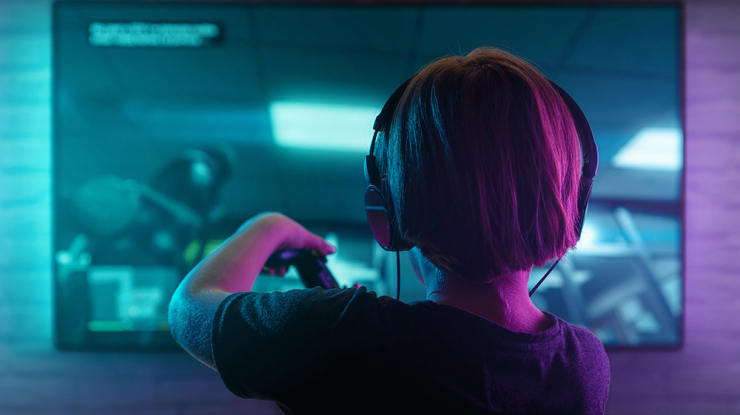
Until two years ago, very much and quite regularly. I was totally fascinated by the role-playing game series “Gothic”, which is like a feature film. You are basically the director and play the lead role at the same time. I found this open world with its phantasmagorical possibilities and adventures truly exciting. I put a lot of time into playing.
Medically speaking, these forms of addiction aren’t really out there. These are terms that get used in the media, by counselors and in scientific literature, but they are pretty much synonyms for the same thing. There is no definite internet or computer addiction as a diagnosis. Rather, it’s actually a non-substance-related dependency that is described as an abnormal habit and impulse control disorder. Or to put it differently: It is an addictive behavior phenomenon that has no specific designation.
I think so, yes. Scientifically, there are two models for the disorder that are being discussed, and both have about equal reception. There is the model of behavioral addiction and the relational or behavior disorder. Hans-Jürgen Rumpf, a psychologist, sees media usage patterns as having a disease component in which the experienced symptoms of a psychological dependency corresponds to the suffering of internet addiction. The sufferers know that they are doing something that actually does them no good, but they are not able to stop by their own volition.
Psychiatrist Bert de Wildt, on the other hand, does not view internet addiction as its own independent disease. He sees it as a familiar mental illness that has shifted into the internet sphere. In his view, already established mental disorders are transferred to corresponding online activities, such as shopping, games, sex or consumption in general.
Adolescent personalities are particularly vulnerable to such stimuli. In the age range from 14 to 24 years, there is an accumulation, which has clearly been shown in the recent study “Prevalence of Internet Addiction – Diagnosis and Risk Profiles”. During this special developmental phase, the possibilities and opportunities grow with the increasing degrees of freedom, but simultaneously one must also make many decisions for and against things. This can sometimes be quite overwhelming. The study also shows that people with mental disorders, such as ADHD, autism, depression or social phobia, show pronounced addiction-like behavior in their media use.
Computer games can thus represent important places of retreat, sheltered spaces where all is under their control. Multiplayer online games, for example, offer a place where the player controls their reputation. A player can find the achievements there that are maybe elusive at home or in school. One’s age, their basic living situation and their mental constitution, therefore, all have a big influence on the degree to which one is susceptible to addiction-like media behavior. This is also the case for classical addictions, such as with drugs and alcohol.
Escapism can be positive or negative, because there is a need behind each behavior. A gamer might log into World of Warcraft or Battlefield, for example, and each time there’s something behind that: a need, minor or major, that isn’t being fulfilled in real life, or the feeling that his everyday life comes up short.
Computer games offer compensation. For relatively little effort, one gets a big effect. The player can pretty much experience comprehensive stimulation on the emotional, social and even physical levels at the push of a button, without having to get up out of their chair, or leave the room.
Massive multiplayer online games, in which millions of users log into a game world and create their own character or world, possess a hugely addictive effect. Whether it’s a sports, simulation or role-playing game, it doesn’t matter which. The fact that the dimensions of the game are boundless is what counts. For one, the game worlds are constantly evolving further and, secondly, one’s avatar can be advanced and changed any way one wishes. These games have virtually no end in the classical sense. That's the big difference to the offline computer games, where eventually the credits roll, like in the movies.
First and foremost, it’s loss of control. When one can no longer regulate oneself, when they can’t say when they started or stopped. Then, one builds up a tolerance. That means, a player has to stay in the game ever longer and with more immersion in order to achieve the same inner state of satisfaction. He is then accepting of negative side-effects, even though he knows better. This leads to withdrawal symptoms in the form of inward irritability, nervousness or panicky thoughts and ruminations.
The player thinks about the game at absurd moments, about the mission that he just has to finish. Very clear warning signals are neglectful and retreat tendencies, such as absenteeism from school. These are aspects that need to be detected from the outside, in the school and family contexts, and raised in discussion.
Compulsive is the wrong term, because a compulsion is always based on a specific fear of something. This isn’t the case with gameplay. Oftentimes, there are even social relationships which attract and retain many players. Many experience their game clan or WhatsApp group as a kind of “second family”. Basically, I think that in this new disorder profile, a behavior that is experienced as very pleasant slips into an addiction-like character. Constant availability is the greatest challenge to self-regulation and thus pushes the limits for classical educational approaches, but also therapeutical approaches for dealing with addiction.
Often enough in the familial context, rampant media behavior is still regulated through coercion and pressure. Getting grounded without television used to be the method, today the router gets switched off or the laptop gets taken away before bedtime. In my experience, this doesn’t help very much, because in the long run rules and prohibitions only create more incentives and awaken ingenuity to get around them.
It is difficult for many parents to understand what their children are up to in the digital world. As a parent, one should ask: “Why are so many people doing it?” the key is honest interest and openness. This leads to conversation, gained insights and, at the same time, a personal connection to the issue.
About the interviewee: Daniel Jäger is a psychologist and specialist adviser for media dependency phenomena at the Annedore Leber Occupational Training Center Berlin. Since 2015, he as worked on the program “ZOE – Zocken Ohne Ende!?” (“Non-stop gaming!?”) for trainees and participants of the vocational services at the training center who have difficulties dealing with everyday duties, due to their rampant consumption of media.
This interview was conducted by Steffi Weinert and Natascha Riebel.
 In the video "Gaming - Where the fun stops", you can find out what the positive aspects of gaming are, but also how it can have a negative impact on our society.
Gaming - Where the fun stops
In the video "Gaming - Where the fun stops", you can find out what the positive aspects of gaming are, but also how it can have a negative impact on our society.
Gaming - Where the fun stops
 "Gaming is actually a fun universe... Gaming could be pure happiness, but unfortunately not if you're a Black woman."
Anyone can be who she wants
"Gaming is actually a fun universe... Gaming could be pure happiness, but unfortunately not if you're a Black woman."
Anyone can be who she wants
SCROLLER

